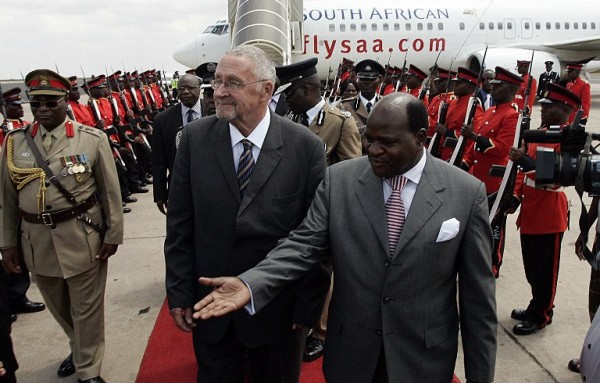Guest post by Andrew J. Novak
 Photo credit to Amos Gumulira.
Photo credit to Amos Gumulira.
After months of rumors about his declining health, Zambian president Michael Chilufya Sata died in a London hospital last night at age 77.![]()
Sata had missed important public events over the past several weeks, including a prominent speech to the United Nations General Assembly, and he appeared unwell at the opening of the Zambian parliament on September 19. Reflecting a level of secrecy that became characteristic of Sata’s three years in office, the Zambian government has still not disclosed the nature of his illness.
Sata was elected in September 2011 on his fourth attempt when he defeated then-president Rupiah Banda, who had himself succeeded president Levy Mwanawasa in 2008 when Mwanawasa died and Banda won reelection by a soft margin three months later. Sata’s death — not unexpected, but swirled in secrecy — is reminiscent of Mwanawasa’s incapacitation. His stroke in summer 2008 sparked widespread rumors and even premature announcements of his death until his condition finally deteriorated in August 2008.
Just as in 2008, the Zambian government has been on ‘autopilot’ since Sata’s health started to fail. And also as in 2008, a new interim leader was appointed, with new elections to be held within 90 days under the Zambian constitution.
This time, however, the situation in Zambia has generated significantly more interest than in 2008, with vice president Guy Scott, an economist and agricultural entrepreneur from Livingstone in southern Zambia, has taken the helm as Zambia’s leader.
Scott is also white, the son of two Scottish immigrants who moved to what was then the British colony of Northern Rhodesia before World War Two, which makes him the first white head of state in mainland sub-Saharan Africa since F.W. de Klerk ruled apartheid South Africa in 1994 and the first white leader of a democratically elected government (though it’s worth noting that Ian Khama, Botswana’s president, was reelected last weekend after a contentious race, and is of mixed-race descent).
Scott’s race has sparked significant media interest, perhaps because of the novelty of Scott’s rise in Zambian politics, unusual in a country where the white community numbers about 40,000 out of a total population of over 14.3 million. Scott was first elected to the Zambian parliament in 1991 from Mpika in Zambia’s northwest region, and he became agriculture minister during the 1992-93 drought. Though he left politics in 1996, he joined Sata’s Patriotic Front (PF) and subsequently returned to parliament in 2006, representing central Lusaka, the Zambian capital. Scott was elected vice president with Sata’s presidential victory in 2011, and he became acting president upon Sata’s death with effect from October 28.
Scott’s ascension as acting president was quite unlikely for another reason — the parentage clause in Article 34(2)(b) of Zambia’s 1996 constitution:
A person shall be qualified to be a candidate for election as President if…(b) both his parents are Zambians by birth or descent.
It would make logical sense, of course, if a vice president and an acting president were constitutionally required to meet the same standards as an elected president, but Article 98 only refers to nominations for president, not qualifications for office. As a result, Scott could be qualified to serve as vice president or as acting president, but not permitted to stand for election as president. It is notable that Zambia’s new draft constitution, which will replace the 1996 version, does not contain this parentage clause in the new Article 98, which outlines the qualifications for presidential candidacy.
Although the parentage provision was originally installed to prevent the candidature of a president whose parents were born outside of Zambia, the Zambian Supreme Court ruled in 1998 that future president Frederick Chiluba could contest the presidency even though one of his parents was born in neighboring Malawi. Like Chiluba, Scott was born in Northern Rhodesia in the period before Zambian independence in 1964, when he became a Zambian citizen.
In 1998, Zambia’s top court ruled that citizenship before Zambia’s existence as a sovereign state was irrelevant. Assuming this case is still a valid precedent, it likely clears the way for Scott to contest Zambian elections, which must be held within 90 days.
What’s less clear, however, is whether Scott would even want to run. At age 70, some news reports suggest that Scott believes he has reached the peak of his political career. In addition, there is some indication that Edgar Lungu, Zambia’s defense minister, was always Sata’s preferred successor. But even if he were not to run, Scott’s acting presidency is likely to be something more substantial than just a Western media novelty.
Zambia is a generally peaceful country in southern Africa landlocked among neighbors that include the Democratic Republic of the Congo, Angola and Mozambique. It has taken a much less turbulent path since its independence in 1964 than its southern neighbor, Zimbabwe. Home to the majestic Victoria Falls, the country produces more copper than any other country in Africa.
Kenneth Kaunda, who governed the country from 1964 to 1991, supported African liberation movements that eventually toppled apartheid rule in South Africa and white minority rule in Rhodesia (now Zimbabwe). Kaunda, however, pursued a strongly centralized economic policy that attempted to nationalize the country’s considerable commodities wealth. In recent years, the Zambian economy has liberalized along with Zambia’s multi-party politics, and China, in particular, has a strong investment stake in the country. Chinese investment, including the treatment of local workers, has become a hot political issue, and will dominate the issues in Zambia’s upcoming snap presidential election.
Andrew J. Novak is adjunct professor of criminology, law, and society at George Mason University.